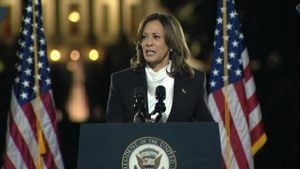Japan's political scene has recently experienced seismic shifts, particularly after the October 27 Lower House election, where the ruling Liberal Democratic Party (LDP) faced an unexpected defeat. This alarming turn of events raises questions about the stability of the nation’s leadership and the future of its longstanding political dynamics.
Prime Minister Shigeru Ishiba’s snap election was intended to cement his hold on power soon after securing his position as LDP leader. Unfortunately for him and the party, it backfired spectacularly. The LDP, which has virtually dominated Japanese politics for nearly seven decades, now finds itself struggling to maintain even the bare semblance of authority.
The LDP managed to secure 191 seats - down from the previous 247 - and, when partnered with its coalition partner Komeito, they toted only 215 seats out of the 465 available. This leaves them significantly shy of the majority threshold of 233 seats necessary to appoint the Prime Minister.
While some might take the election results as validating democratic processes, the ramifications extend beyond domestic politics. The LDP’s defeat could destabilize not just Japan but the wider Indo-Pacific region, which has relied on Japan as a stabilizing force amid rising tensions.
Public sentiment played a major role in this electoral shift. There were widespread frustrations over political financing scandals and concerns about Japan’s economic future, factors which likely influenced voters to turn against the LDP for possibly the first time since 1955.
Further complicate matters, Ishiba’s rapid call for elections following his ascent to leadership might have prevented him from establishing meaningful connections with Japanese voters. The public did not see the election as merely about who would lead the LDP; it became reflective of broader dissatisfaction with years of political homogeneity.
Chances of coalition-forming to achieve governance are slim for the LDP. Superior opposition unity delays any prospects of establishing new power. Even if they are able to form partnerships, the question remains whether the LDP can maintain its relevance amid increasing public skepticism.
What does this mean for Ishiba and the LDP? First, his hold over leadership is currently tenuous at best. A damaged reputation for both him and the party could spark another internal power struggle, underscoring the already fragile power dynamics within the LDP.
Given the current political climate, is the return of Japan's 'revolving door' leadership now inevitable? Many observers recall the years of instability marked by transient prime ministers from 2006 to 2012, leading to perceptions of indecisive leadership during tumultuous times. With the spotlight now on Ishiba, questions about his capability to effect change loom large.
Japan's ability to project power on the global stage may wane without consistent leadership to advocate for regional stability. Former Prime Minister Shinzo Abe's vision for a rules-based Indo-Pacific order was widely respected; certainly, Suga and Kishida continued advocating for this doctrine. Yet the current electoral outcome threatens to derail years of diplomatic effort as Japan squabbles internally.
While the LDP's lengthy governance may indicate experience, this recent defeat has brought forth discussions about the health of Japan’s democracy. The opposition parties, having captured more than 235 seats, may present new, viable alternatives which have the potential to invigorate the political conversation, especially among younger voters who have long been apathetic.
The question of whether Japan has entered the beginning of its next big political chapter is exciting for many. The campaign paths of opposition leaders are now being examined more closely, as efforts toward reinstilling public confidence continue. No calls for questioning the election outcomes emerged from the electorate, demonstrating signs of democratic resilience.
Nonetheless, with the window for crafting coalitions still open, time is of the essence for the parties involved. The clock ticks toward November 26, marking the constitutional deadline for parliament's initial meeting. If the LDP fails to swiftly navigate this political maze, it may awaken the possibility of governance sans the LDP.
Subsequently, as Japan embarks on its post-election revitalization, observers worldwide eagerly watch how the country navigates its place within the fold of the Indo-Pacific's equilibrium.
Sharing the stage with Japan's political changes is the American military presence, particularly concerning the V-22 Osprey fleet. Japan once again grounded its fleet following a flight incident it experienced during the U.S.-led military exercise, Keen Sword. Importantly, this incident adds to the scrutiny surrounding the aircraft - which has previously faced several safety complaints.
During the military exercise, one V-22 Osprey began to sway unexpectedly during takeoff, damaging part of its wing upon contact with the ground. Fortunately, no one got hurt, but Defense Minister Gen Nakatani stated the fleet would remain grounded pending investigation.
This follows recent turmoil surrounding the platforms as they were grounded for months after previous incidents, including one tragic crash off Japan's coast last November. The introduction of the V-22 Osprey has sparked community backlash - especially from residents of Okinawa, who have raised serious safety concerns over the aircraft.
Nakatani continues to advocate the aircraft's safety, but both the Japanese and U.S. militaries face pressure to demonstrate assurance for community leaders still asserting fear about the Osprey’s safety. Japan's willingness to ground its Osprey fleet signifies proactive governance, aligning with concerns stemming from local communities. Ensuring the safety of military exercises, especially when near civilian populations, remains integral to Japan's relationship with the United States.
Lastly, the path forward for Japan seems fraught with trials, be it political or military. Mainstream discussions relate closely to the broader theme of civilian involvement and placing public concerns at the forefront of political decisions.
Although Japan wrestles with its political backbone, it must continue to balance regional expectations against its internal struggles. Future weeks and months will test the resolve of the LDP and its leadership, forcing the political climate to confront both past legacies and future aspirations.
From the election results to military exercises, Japan currently stands at the crossroads, with imminent decisions to shape the nation's next chapter looming on the horizon.



